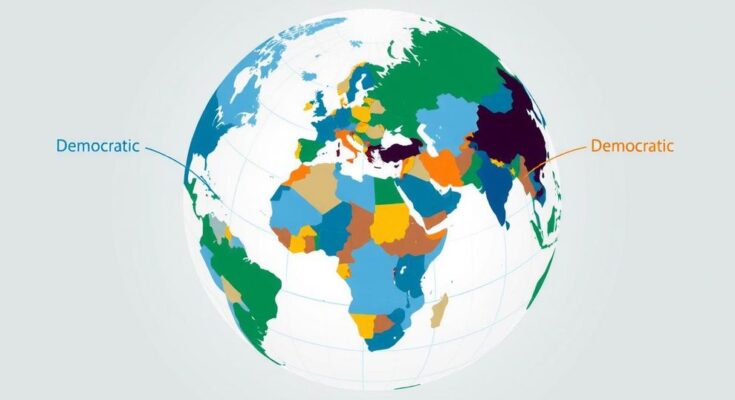Numerous nations incorporate “Democratic” in their official titles to signify political aspirations; however, the truth about their governance often tells a different story. Notable examples include the Democratic Republic of the Congo, North Korea, Algeria, and Sri Lanka, all facing significant challenges in embodying democratic values. The use of “Democratic” may be more symbolic than indicative of their actual political systems, as evidenced by global statistics reflecting democracy versus autocracy.
Numerous countries around the globe incorporate the term “Democratic” in their official titles, signaling their political objectives and intentions. Nevertheless, the actual governance and political realities of these nations frequently diverge from the democratic ideals that their names imply. This discrepancy illustrates the complex nature of democratic representation worldwide.
Some prominent examples of countries with “Democratic” in their names include the following:
– Democratic Republic of the Congo: Renowned for its extensive natural resources, the DRC has struggled with decades of political instability and civil conflict, challenging its efforts to establish democratic institutions.
– Democratic People’s Republic of Korea (North Korea): Contrary to its name, North Korea operates as a totalitarian state under a dynastic regime. It is recognized as one of the most oppressive governments worldwide, with power concentrated within the ruling Kim family.
– People’s Democratic Republic of Algeria: Following its transition from French colonial rule to independence in the 1960s, Algeria conducts elections but faces criticism for authoritarian practices, particularly during the civil strife of the 1990s.
– Democratic Socialist Republic of Sri Lanka: Sri Lanka boasts a rich tradition of parliamentary democracy, blending democratic and socialist elements. However, ethnic conflicts and a history of civil war have complicated its democratic governance.
Additional countries featuring the term “Democratic” in their official names include the Democratic Republic of Timor-Leste, the Federal Democratic Republic of Ethiopia, the Lao People’s Democratic Republic, the Federal Democratic Republic of Nepal, and the Democratic Republic of São Tomé and Príncipe. The presence of “Democratic” in a nation’s name is often symbolic, reflecting an intention or aspiration to maintain democratic governance, although the actual political landscapes may vary drastically. As of the end of 2017, 96 out of 167 countries with populations exceeding 500,000 (approximately 57%) were identified as democracies to some extent, in contrast to 21 nations (around 13%) classified as autocracies.
In conclusion, while several countries bear the term “Democratic” in their official names, the reality of their governance often diverges from the democratic ideals they purport to represent. This inconsistency calls into question the authenticity of these nations’ political systems as they grapple with challenges that undermine true democratic principles. Ultimately, the use of the term may serve more as an aspirational designation rather than a reflection of actual governance.
Original Source: globalsouthworld.com




